|
|
|
Sort Order |
|
|
|
Items / Page
|
|
|
|
|
|
|
| Srl | Item |
| 1 |
ID:
047443
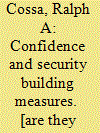

|
|
|
|
|
| Publication |
Honolulu, Pacific Forum CSIS, 1995.
|
| Description |
iii, 18p.
|
|
|
|
|
|
|
|
|
|
|
|
Copies: C:1/I:0,R:0,Q:0
Circulation
| Accession# | Call# | Current Location | Status | Policy | Location |
| 043375 | 355.033054/COS 043375 | Main | On Shelf | General | |
|
|
|
|
| 2 |
ID:
050188
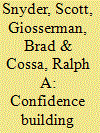

|
|
|
|
|
| Publication |
Hawaii, Pacific Forum CSIS, 2001.
|
| Description |
v.p
|
|
|
|
|
|
|
|
|
|
|
|
Copies: C:1/I:0,R:0,Q:0
Circulation
| Accession# | Call# | Current Location | Status | Policy | Location |
| 044936 | 355.03/SNY 044936 | Main | On Shelf | General | |
|
|
|
|
| 3 |
ID:
102388
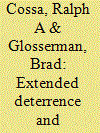

|
|
|
|
|
| Publication |
2011.
|
| Summary/Abstract |
Members of the Japanese government and the Japanese security elite welcomed the 2010 US Nuclear Posture Review (NPR) Report, praising its emphasis on the twin goals of pursuing disarmament and protecting international peace and stability. Unlike many non-nuclear weapon states, Japan does not condition its support for nonproliferation upon nuclear weapon states' progress on denuclearization. Despite general enthusiasm for the review in Japan, concerns remain. The NPR emphasizes the threat posed by nuclear weapons in the hands of non-state actors; from Japan's vantage point, state actors-North Korea, China, and Russia-are just as worrisome. While disarmament advocates in Japan had hoped the NPR would endorse a no-first-use doctrine or "sole purpose" declaration, defense officials and strategists were relieved it did not go that far, fearing that to do so would undermine US extended deterrence and leave Japan vulnerable to attack by North Korean biological or chemical weapons. US policy toward China shadows many Japanese concerns about security policy in general and nuclear policy in particular. In the absence of more clarity on the Sino-US relationship, Japanese concerns can be expected to increase. Nonetheless, the Japanese government has responded positively to the release of the NPR, in large part due to unprecedented levels of coordination and consultation between Tokyo and Washington during the drafting process. Tokyo now seeks continued close consultation on nuclear strategy and policy to develop a better understanding of the concept of extended deterrence and what Tokyo can do to support this shared goal.
|
|
|
|
|
|
|
|
|
|
|
|
|
|
|
|
| 4 |
ID:
002233
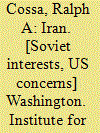

|
|
|
|
|
| Publication |
Washington, Institute for National Strategic Studies, 1990.
|
| Description |
110p.
|
| Series |
McNair Papers; no.11
|
|
|
|
|
|
|
|
|
|
|
|
Copies: C:1/I:0,R:0,Q:0
Circulation
| Accession# | Call# | Current Location | Status | Policy | Location |
| 032565 | 355.020955/COS 032565 | Main | On Shelf | General | |
|
|
|
|
| 5 |
ID:
006684
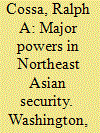

|
|
|
|
|
| Publication |
Washington, D C, National Defence University Press, 1996.
|
| Description |
75p.
|
| Series |
McNair papers;51
|
|
|
|
|
|
|
|
|
|
|
|
Copies: C:2/I:0,R:0,Q:0
Circulation
| Accession# | Call# | Current Location | Status | Policy | Location |
| 038346 | 355.03305/COS 038346 | Main | On Shelf | General | |
| 038472 | 355.03305/COS 038472 | Main | On Shelf | General | |
|
|
|
|
| 6 |
ID:
125255
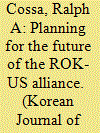

|
|
|
|
|
| Publication |
2013.
|
| Summary/Abstract |
Although it is hard to predict how and when the Korean Peninsula will finally become reunited, there is no doubt that the best means to ensure peace on the Korean Peninsula is through maintaining a strong ROK-U.S. alliance, both today and after reunification. A new approach with a midterm goal of peaceful coexistence is needed to keep Pyongyang positively engaged and to set the stage for eventual
Reunification and denuclearization. While Washington may take the lead in dealing with the nuclear issue, Seoul must take the lead in Korean Peninsula reunification. The U.S. and ROK must agree upon and then jointly articulate their respective roles and missions and begin making the case today for a role for the alliance post-reunification. For the denuclearization and the non-proliferation message to be kept firm, maintaining a strong ROK-U.S. alliance is critically essential.
|
|
|
|
|
|
|
|
|
|
|
|
|
|
|
|
| 7 |
ID:
089145
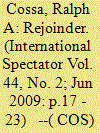

|
|
|
|
|
| Publication |
2009.
|
| Summary/Abstract |
The US-China relationship is one of the most important bilateral relationships in the world. As two of the world's largest economies, there can be no solution to the global economic crisis if the two work at cross purposes and many of the region's most complex security challenges - North Korean denuclearisation first among them - require Sino-US cooperation. The good news is that both US President Barrack Obama and Chinese President Hu Jintao are aware of and accept the shared responsibility and necessity for a cooperative approach toward dealing with the global financial crisis and regional security challenges; both have pledged to develop a "positive, cooperative and comprehensive" relationship and build mutual trust in a way that encourages, rather than worries, friends and allies in the Asia Pacific.
|
|
|
|
|
|
|
|
|
|
|
|
|
|
|
|
| 8 |
ID:
091865
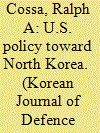

|
|
|
|
|
| Publication |
2009.
|
| Summary/Abstract |
President Obama offered to extend a hand to those who were "willing to unclench [their] fist," and promised a clear, consistent, cooperative, and consultative approach to achieve Korean peninsula denuclearization. Unfortunately, Pyongyang chose not to cooperate, deciding instead to challenge the new American leader, in the form of a "satellite launch" that created a crisis where none would have otherwise existed. The reasons why Pyongyang chose to go down this path remain open to wide speculation. But the United States, the Republic of Korea (ROK), and others must now assume that Pyongyang has made the "strategic decision" not to give up its nuclear weapons and must now deal with this reality. What is needed now is a clearly expressed policy of containment aimed at keeping what is in North Korea in North Korea and which keeps out anything else that would help the regime develop its nuclear or missile capabilities. This does not mean that Washington is prepared to recognize North Korea as a nuclear weapons state. The goal still remains the complete, verifiable, irreversible elimination of Pyongyang's nuclear weapons capabilities. The United States does recognize that this will be a multi-stage process and that counter-proliferation is a major step in this process. So is tightening the noose around Pyongyang to increase the political, military, and economic costs associated with going down the nuclear path.
|
|
|
|
|
|
|
|
|
|
|
|
|
|
|
|
| 9 |
ID:
061891
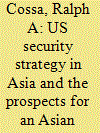

|
|
|
|
|
|
|
|